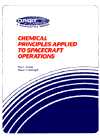This book fills the void in traditional space environment texts as it covers chemistry in much greater depth. In the light of the extended periods of time future spacecraft and space stations must operate, aerospace personnel cannot be ignorant of chemistry and expect their designs to be successful. Chemical Principles Applied to Spacecraft Operation is of tremendous use to the beginner because it provides all the basic material in one book. It also is of use to the expert looking to gain additional information on a particular subject since there is an unprecedented coverage of concepts and a complete set of references included at the end of each chapter. Discussion questions and workout problems are at the end of each chapter to help organize key aspects of each chapter.
Those readers possessing a good understanding of chemistry and astrodynamics can skip the review chapters, Chapters 1 and 2, and move right into the heart of the book. Few individuals are well-versed in both fields, which was one of the driving factors behind the creation of this book. Yet it will become increasingly important for space chemists to be comfortable with astrodynamics while aerospace engineers will have to understand chemical principles affecting spacecraft operations. Whether it is used as a course text or aerospace design aid reference, this book provides the reader with necessary and vital information pertaining to chemistry's role in spacecraft design and operations.

